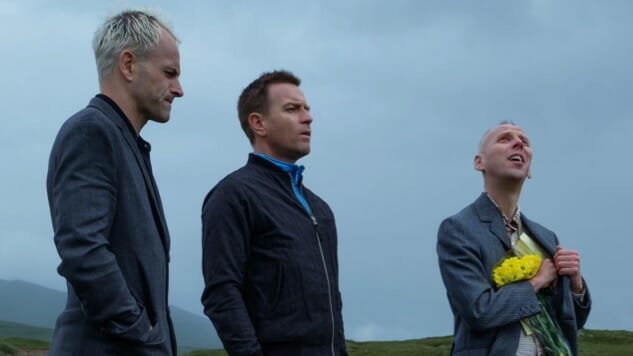T2 Trainspotting

SICK BOY: It’s certainly a phenomenon in all walks of life.
RENTON: What do you mean?
SICK BOY: Well, at one time, you’ve got it, and then you lose it, and it’s gone forever. All walks of life: George Best, for example. Had it, lost it. Or David Bowie, or Lou Reed…
RENTON: Right.
—Trainspotting
Danny Boyle’s Trainspotting 2 suffers from the hurdle of the Star Wars sequel. The story is being pitched to an aware audience.
The first Trainspotting was magnificent on its own terms: acting, directing, dialogue, source material. Add the zeitgeist to it, and it’s practically untouchable. I was a teenager in 1996, saw it in the Dallas Galleria. It was the Nineties. The end of history had arrived. Nobody knew what exactly to do. Just like every other moment in history. I wrote a glowing essay about it for my hometown paper’s teen section. I got my grandfather to go see it.
At the beginning of the new film, Mark Renton (Ewan McGregor), now living in Amsterdam, suffers a heart attack on a treadmill. Deciding life overseas has nothing for him, he returns home to Edinburgh twenty years after ripping off his mates from a smack deal. Simon (no longer called “Sick Boy,” but still played by Jonny Lee Miller) and Spud (Ewen Bremner) are not pleased to see him, and Begbie (Robert Carlyle) breaks out of prison at roughly the same time. The engine of revenge is thrown into full gear.
While the women of Trainspotting—Kelly Macdonald (Diane, now a lawyer) and Shirley Henderson (Gail, now a mother to Spud’s child)—are granted a few lines here and there, they’ve clearly grown up and are there mostly to shake their heads at the boys in the bad lofts.
As a filmmaker, you can’t walk into the room without addressing the obvious: how do you make a sequel to one of the greatest movies of an era, a piece of cinema that was famous for being irreverent, cynical, nihilistic—and on top of all that, still somehow life-affirming? The characteristics that made the first film naturally oppose bringing about a sequel. Even if the filmmakers pulled off a miracle, they couldn’t hope to recreate the perfect marriage of art to time. So what do you do?
What you do is make T2. The insight of this film is to take:
What must be true of sequels in general—the same scenarios get repeated to give the audience the same feelings; what must be true of sequels to gigantic cultural phenomena—you will never quite get the same feeling repeated; what must be true of the ex-junkie and scam artist characters—the same character flaws get repeated; what must be true of drug use—the same hit over and over again, until it’s not enough; what must be true of the reality of the modern British working class—inter-generational poverty means living in the same housing projects, living the same lives.
-

-

-

-

-

-

-

-

-

-

-

-

-

-

-

-

-

-

-

-

-

-

-

-

-

-

-

-

-

-

-

-

-

-

-

-

-

-

-

-








































